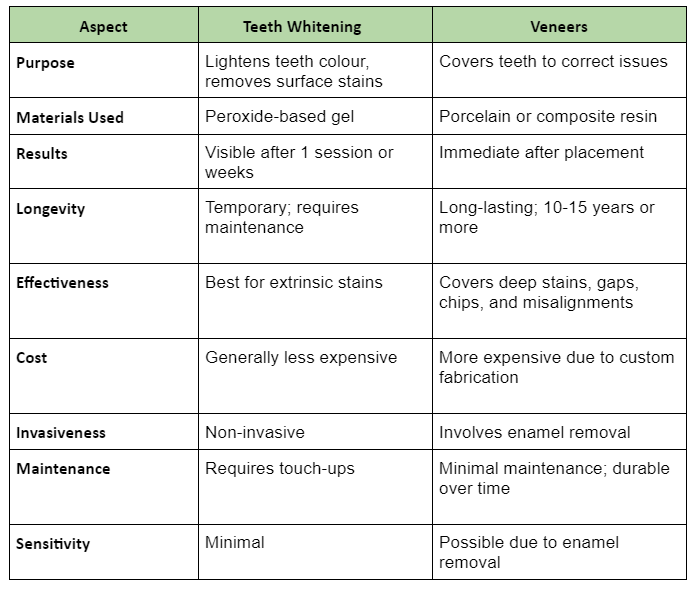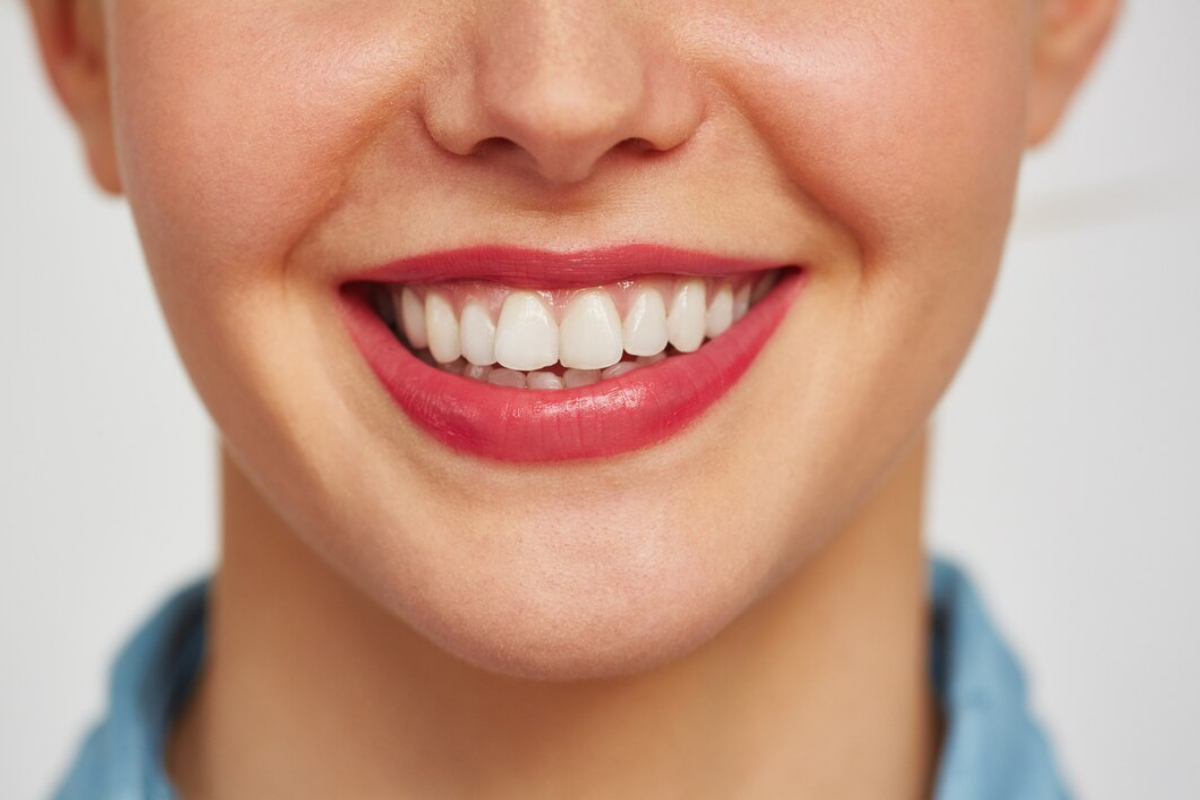A bright, beautiful smile can boost your confidence and leave a lasting impression. But if your teeth aren’t as white as you’d like, you might wonder which cosmetic dental option is best for you: teeth whitening or veneers. Both options have their benefits, but they serve different purposes and come with their own set of considerations. Let’s explore these two popular treatments to help you make an informed decision.
Teeth Whitening: What It Is, How It Works, and Downsides
What is Teeth Whitening?
A cosmetic dentistry procedure called teeth whitening brightens your teeth’s colour. This can be done in a dentist’s clinic or at home with over-the-counter products. The main goal of teeth whitening is to remove stains and discoloration from the tooth surface, giving you a brighter smile.
How Does Teeth Whitening Work?
Teeth whitening treatment uses a peroxide-based gel to break down stains on your teeth, making them appear whiter. There are various options available, including professional treatments for quick results and at-home kits for gradual improvement.
- Professional whitening: Performed by a dentist, this method uses a higher concentration of whitening gel and often includes a special light to speed up the process. After just one session, the results are visible.
- At-home whitening kits: These kits, which you can get from your dentist or over the counter, come with trays or strips that you apply to your teeth. The concentration of peroxide is lower than professional treatment at dental clinic, so it takes longer to see results.
Benefits of Teeth Whitening
- Quick results: Professional whitening can show significant results in about an hour.
- Cost-effective: It is generally more affordable than veneers.
- Non-invasive: The procedure doesn’t involve altering the tooth structure.
Drawbacks of Teeth Whitening
- Temporary results: Whitening needs to be maintained with touch-ups every few months or years, depending on your habits and the original colour of your teeth.
- Limited to certain stains: Whitening works best on extrinsic stains (stains on the surface of the teeth caused by food, drinks, or smoking). It is less effective on intrinsic stains, which are deeper and may result from medication or trauma.
If you’re considering teeth whitening in Millwoods, understanding these limitations will help you make an informed decision about the best way to achieve your ideal smile.
Veneers: What It Is, How It Works, and Downsides
What are Veneers?
Veneers are sleek, custom-crafted shells of porcelain or composite resin that fit seamlessly over the front of your teeth. They’re designed to blend perfectly with your natural teeth or elevate their appearance for a flawless, uniform smile.
How Do Veneers Work?
To apply veneers, a small amount of enamel is typically removed from the front of the tooth to make room for the shell. The veneer is then bonded to the tooth using a special adhesive. Veneers can address various cosmetic issues, such as:
- Discoloration: Unlike whitening, veneers cover up stains that are resistant to bleaching.
- Minor misalignment: They can make slightly crooked teeth appear straight.
- Gaps: Veneers can be used to fill in minor gaps between teeth.
- Chips and cracks: They can cover up minor damage to your teeth.
Benefits of Veneers
- Long-lasting: Veneers can last 10-15 years or longer with proper care.
- Stain-resistant: Porcelain veneers resist staining better than natural teeth, keeping your smile bright over time.
- Comprehensive coverage: Veneers can address a range of cosmetic issues, from shape and size to colour and alignment. By opting for porcelain veneers near you in Millwoods, you’re choosing a solution that can transform your smile comprehensively and conveniently.
Drawbacks of Veneers
- Cost: Veneers are more expensive than teeth whitening due to the materials used and the need for a custom fit.
- Irreversible: The process of removing enamel to place veneers is permanent, and the tooth will always need some form of coverage once this is done.
- Possible sensitivity: Removing enamel can cause sensitivity to hot and cold temperatures.
Teeth Whitening vs. Veneers: Key Differences

How to Choose: Teeth Whitening or Veneers?
The choice between teeth whitening and veneers is based on your specific needs and the current condition of your teeth. To assist you in making your decision, consider the following factors:
Opt for Teeth Whitening If:
- You want a quick, cost-effective solution: Teeth whitening is ideal for those who want to brighten their smile without a significant investment of time or money.
- Your teeth are in good shape: Whitening works best on healthy teeth without substantial cracks or chips.
- You’re dealing with surface stains: If you’re thinking about teeth whitening near you, it’s especially good at removing surface stains from coffee, tea, wine, or smoking. For the best results, check with a local dentist to make sure your teeth are ready for whitening!
Choose Veneers If:
- You want a complete smile makeover: Veneers can address multiple cosmetic concerns simultaneously, from discoloration to gaps and minor misalignment.
- You have deep stains or damaged teeth: If your teeth are discoloured due to intrinsic factors or have chips and cracks, veneers can provide a more uniform appearance.
- You are looking for a long-term solution: Veneers offer a durable and lasting option for a beautiful smile.
Consulting with Your Dentist
Before choosing between teeth whitening or veneers, consult with our dentist in Millwoods. Our team will evaluate your oral health, understand your goals, and guide you to the best option. With Dental Elements, you’ll receive tailored advice to achieve the stunning smile you’ve always dreamed of!

